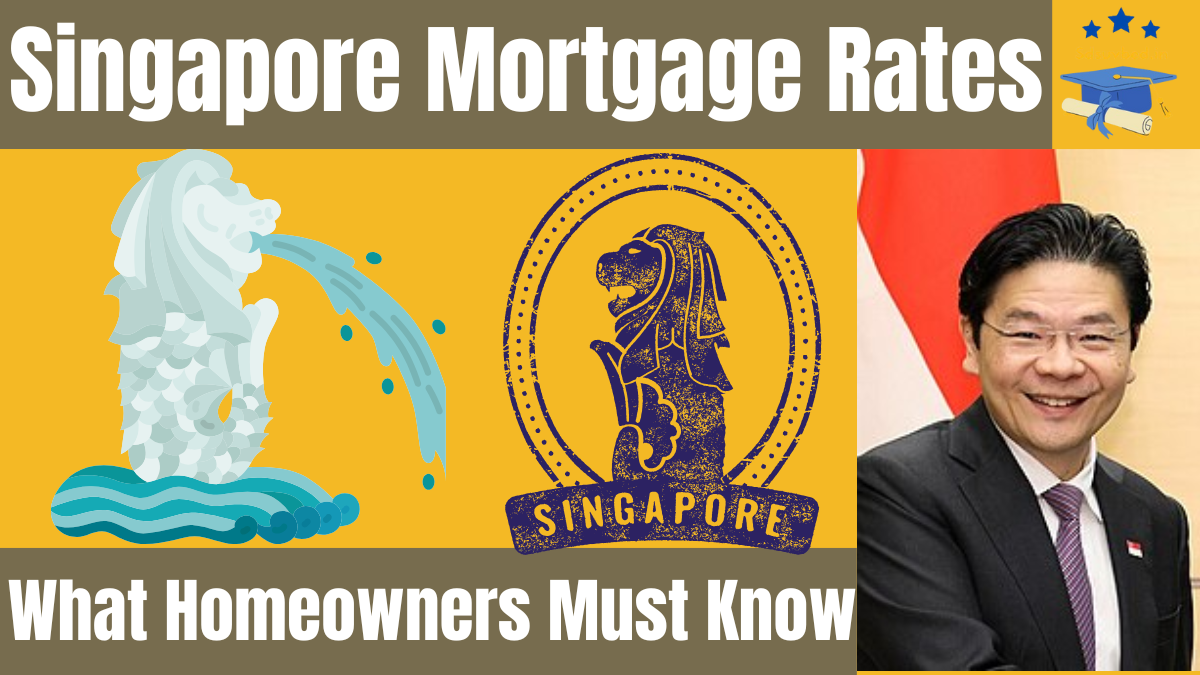US Federal Reserve interest rates play a crucial role in global financial markets, including Singapore’s mortgage rates. When the Fed cuts interest rates, borrowing costs in the US decrease, affecting international lending and borrowing trends.
In September and November 2024, the Fed cut interest rates for the first time since 2020, lowering them from 5.25-5.5% to 4.5-4.75%. These reductions are expected to have ripple effects on home loan rates in Singapore. But what does this mean for homeowners and prospective buyers?

How Are US Fed Interest Rates Connected to Singapore Mortgage Rates?
Singapore’s Monetary Authority of Singapore (MAS) does not directly control interest rates. Instead, it manages monetary policy by adjusting the exchange rate. However, Singapore’s financial system is still highly influenced by global markets, particularly the US Federal Reserve.
This connection is most evident in SORA (Singapore Overnight Rate Average), which is used as the benchmark for most mortgage interest rates in Singapore.
- SORA tracks the cost of borrowing in Singapore’s interbank market.
- When US Fed rates rise or fall, SORA eventually adjusts in response.
- Home loans with floating interest rates, pegged to SORA, will change accordingly.
So, when the Fed cuts rates, home loan interest rates in Singapore may decrease, reducing the overall cost of mortgage repayments.
How Do Fed Rate Changes Affect SORA and Mortgage Rates?
Historically, SORA tends to follow Fed interest rate movements but with a delay. Below is a table showing how US Fed rate hikes in 2023 influenced 3M Compounded SORA rates in Singapore:
| US Fed Meeting Date | Fed Funds Rate (%) | 3M Compounded SORA Rate (%) |
|---|---|---|
| 1 Feb 2023 | 4.50% – 4.75% | 3.1525% |
| 22 Mar 2023 | 4.75% – 5.00% | 3.4394% |
| 3 May 2023 | 5.00% – 5.25% | 3.6076% |
| 14 Jun 2023 | 5.00% – 5.25% | 3.6501% |
| 20 Sep 2023 | 5.00% – 5.25% | 3.7059% |
| 1 Nov 2023 | 5.00% – 5.25% | 3.7556% |
| 13 Dec 2023 | 5.00% – 5.25% | 3.7462% |
This data shows that even when the Fed stopped hiking rates in May 2023, it took until November 2023 for SORA rates to stabilize. This lag means that Singapore homeowners may not see an immediate drop in mortgage rates when the Fed cuts rates—but reductions will likely occur over time.
How Will Fed Rate Cuts Affect Homeowners in Singapore?
With further Fed rate cuts expected in 2025, here’s how homeowners in Singapore will be affected:
Will Monthly Mortgage Payments Decrease?
Yes! Lower Fed rates typically lead to cheaper home loan interest rates in Singapore. This translates to lower monthly repayments for homeowners with floating-rate mortgages pegged to SORA.
For example:
- A 1% decrease in mortgage interest rates can significantly reduce monthly payments.
- If a homeowner has a $1.5 million home loan over 25 years at 3.4% interest, a 1% rate drop will lower their repayments by approximately $775 per month.
Will Loan Eligibility Increase?
Lower interest rates can increase loan eligibility because banks use a stress test rate to assess affordability. This rate, which is higher than actual market rates, determines how much a borrower can take out while ensuring they can afford repayments even if rates rise.
As mortgage rates drop, banks may reduce their stress test rates, allowing buyers to qualify for larger loan amounts.
For example:
- If the stress test rate falls from 4.85% to 4.4%, a homebuyer earning $10,000 per month could see their loan eligibility increase from $1.04 million to $1.09 million.
Should You Refinance Your Home Loan Now or Wait?
Homeowners with existing loans might wonder whether they should refinance now or wait for further rate cuts in 2025.
Here’s a cost breakdown:
- If a homeowner refinances a $1.5 million loan from 3.4% to 2.4% in November 2024, they save about $3,100 by March 2025.
- If they wait until March 2025, the interest rate must fall below 2.3% to match these savings.
So, locking in a lower mortgage rate now could be a safer option instead of waiting for uncertain future cuts.
How Can Homeowners Take Advantage of Lower Mortgage Rates?
If mortgage rates decline further in 2025, here’s what homeowners can do:
- Refinance to a lower-rate mortgage package to cut monthly repayments.
- Consider a floating-rate home loan to benefit from future interest rate drops.
- Choose a mortgage with a free conversion option to adjust the rate if interest rates fall further.
Banks are also offering shorter lock-in period loans, giving homeowners more flexibility to refinance when needed.
FAQs
Will Singapore mortgage rates drop if the US Fed cuts rates?
Yes, but the effect will not be immediate or proportional. SORA rates adjust gradually, meaning home loan interest rates will decrease over time.
How does the Fed interest rate affect SORA?
SORA reflects the cost of borrowing between banks in Singapore. Since global liquidity affects these rates, changes in US Fed interest rates eventually influence SORA rates.
Should I refinance my home loan now or wait?
Refinancing now can lock in savings if rates are lower than your current home loan rate. Waiting might result in missed savings if future cuts don’t materialize as expected.
How much can I save if mortgage rates drop by 1%?
For a $1.5 million loan over 25 years, a 1% decrease in interest rates could reduce monthly repayments by about $775.
Does the MAS control mortgage interest rates in Singapore?
No, MAS does not set interest rates like other central banks. Instead, it manages monetary policy through the exchange rate, allowing global market conditions to influence home loan rates.
Are floating or fixed-rate mortgages better in 2025?
If rates are expected to decline, floating-rate mortgages may offer lower costs. However, if homeowners prefer stability, a fixed-rate mortgage is a safer option.
How can I check if I should refinance my home loan?
Homeowners should compare their current loan with market rates. If refinancing can lower their rate by at least 0.5-1%, it might be beneficial.
Will banks lower their stress test rate if mortgage rates drop?
Yes, if mortgage rates fall, banks may adjust stress test rates, allowing borrowers to qualify for larger home loans.
Click here to know more.
A passionate content writer specializing in creating engaging, SEO-optimized content. With expertise in blogs, web copy, and storytelling, I craft words that connect with audiences and deliver results.
